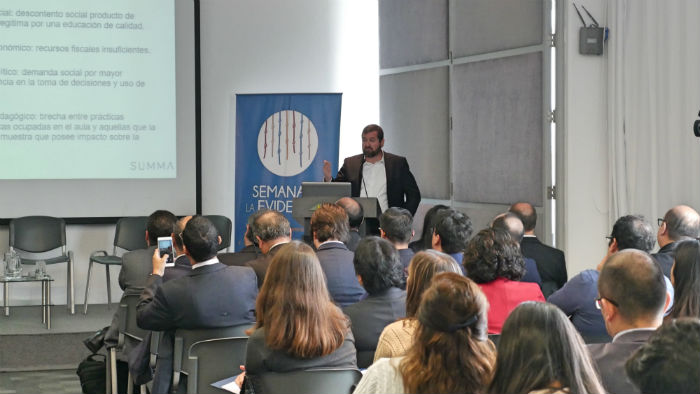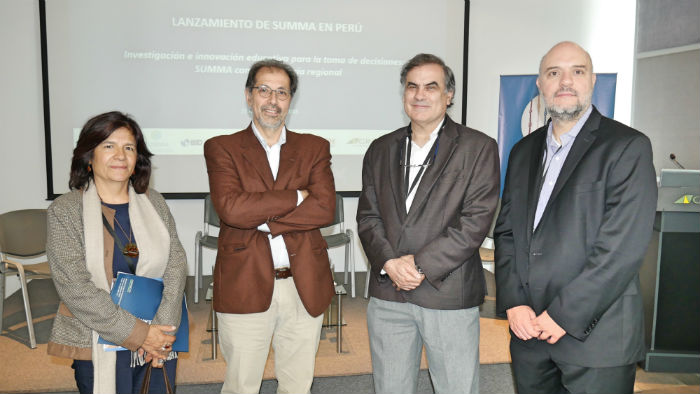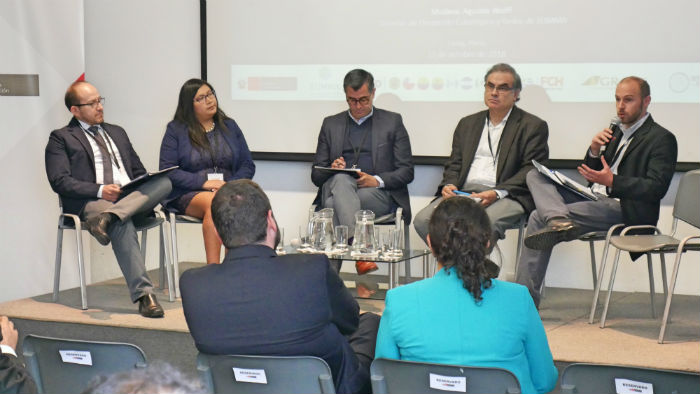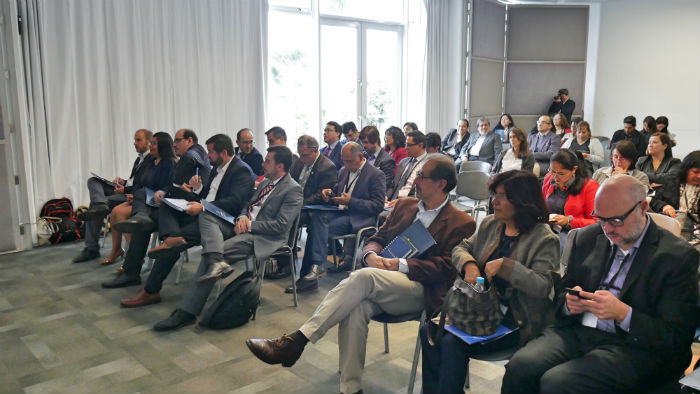COMPARTIR
Launch of SUMMA in Peru | Evidence Week, Lima
October 22, 2018SUMMA was represented by its director, Javier Gonzalez; as well as Bárbara Flores, Director of Educational Policy Research, and Agustín Wolff, Director of Strategic Development and Network Management. During the seminar, entitled “Educational research and innovation for decision making: SUMMA as a regional strategy”, attendees reflected on the challenges faced by education systems in Latin America and the Caribbean, with special focus on the Peruvian system. Matters such as educational financing policies and strategies to promote innovative and effective educational practices in the country’s schools, were also addressed.
Watch the video of the seminar here

From left to right: Carlos Castro, Secretary of Strategic Planning of MINEDU; Carolina Méndez, Education Specialist at the Inter-American Development Bank in Peru and Javier González, Director of SUMMA.
Carlos Castro, Secretary of Strategic Planning of the Ministry of Education of Peru, highlighted the great challenges facing education in Peru, organized in four axes/challenges of the government in the field of Education, and that urgently need to be addressed by the country: the development of a teaching career, initial education, educational infrastructure and emotional infrastructure, related to equipping students with the skills to develop their educational and life paths. The authority also pointed out that “these challenges are achieved with strategic allies such as SUMMA and with evidence”.
 For his part, Javier Gonzalez, director of SUMMA, presented the question “Where to start to be effective in education?”, a question to which SUMMA responded “investing more and better”. As a reference, he pointed out that Peru spends 1/5 of what the average OECD country invests in Education, and that has a strong impact on quality. He also mentioned that when countries such as Finland (1978) and Austria (1971) had the same level of development as Chile has today – same per capita GDP – those countries had a 10% higher tax burden; he also recalled that the United States maintained for decades a tax burden of 90%, which responds to a political decision of the country, a definition of the type of development that is wanted for the country.
For his part, Javier Gonzalez, director of SUMMA, presented the question “Where to start to be effective in education?”, a question to which SUMMA responded “investing more and better”. As a reference, he pointed out that Peru spends 1/5 of what the average OECD country invests in Education, and that has a strong impact on quality. He also mentioned that when countries such as Finland (1978) and Austria (1971) had the same level of development as Chile has today – same per capita GDP – those countries had a 10% higher tax burden; he also recalled that the United States maintained for decades a tax burden of 90%, which responds to a political decision of the country, a definition of the type of development that is wanted for the country.
Gonzalez also highlighted three elements that cross the debate around the challenges of education and how to make wise decisions in this field: (i) innovation is best built from ecosystems, rather than from individual work; (ii) the value of collaboration over competition and (iii) it is essential that decision-making is based on principles and evidence-informed, always in a democratic context. Thus, for example, the evidence that privileges efficiency over principles such as justice or equity does not point to quality in education systems.
The launch took place on Monday, October 22 at GRADE headquarters, and was also attended by Javier Game, head of operations of the Inter-American Development Bank; Santiago Cueto, executive director of GRADE; Magaly Robalino, UNESCO representative in Peru; and Gregory Elacqua, chief economist of the Education Division of the IDB, among other experts, academia, representatives of international organizations and civil society.

From left to right: Magaly Robalino, UNESCO Representative in Peru; José Santos Rodríguez, Head of the Economics Department of Pontificia Universidad Católica de Perú; Santiago Cueto, Executive Director of GRADE and Gregory Elacqua, Chief Economist of the Education Division of the IDB.
Schedule
08.45 – 09.15 Registration
09.15 – 09.25 Welcome by Santiago Cueto, Executive Director of GRADE.
09.25 – 09.45 Remarks by Carlos Lorenzo Castro Serón, Secretary of Strategic Planning of MINEDU, on the current situation and challenges of education in Peru.
09.45 – 10.00 Presentation by Javier Game, Head of Operations of the Inter-American Development Bank in Peru IDB’s educational strategy in the region and SUMMA’s relevance.
10.00 – 10.20 Presentation by Javier González, Director of SUMMA. Critical nodes of education policy in the region and SUMMA’s proposal.
10.20 – 11.10 First Conversation: Funding challenges to achieve more equitable, inclusive and quality education. Participants:
– Magaly Robalino, UNESCO Representative in Peru
– Gregory Elacqua, Chief Economist, Education Division, Inter-American Development Bank (IDB)
– Milagritos Vera, Head of the Office of Strategic Planning and Budget, MINEDU
– José Santos Rodríguez, Head of the Economics Department of Pontificia Universidad Católica de Perú.
Moderator: Carolina Méndez, Education Specialist at the Inter-American Development Bank in Peru.
11.10 – 12.00 Second Conversation: How to promote innovative and effective educational practices in our schools? Participants:
– Santiago Cueto, Executive Director of GRADE
– Paul Neira del Ben, National Education Counsellor; Managing Director of The Learning Factor
– Roberto Barrientos, Manager, Learning Communities, Natura/Marcelino Champagnat University
– Annie Chumpitaz, Head of the Office of Strategic Monitoring and Evaluation, MINEDULAB
Moderator: Agustín Wolff, Director of Strategic Development and Network Management at SUMMA.
12.00 – 12.05 Remarks by Javier González, Director of SUMMA. Closing of SUMMA launch.
12.05 – 12.10 Remarks by Annie Chumpitaz, Head of the Office of Strategic Monitoring and Evaluation, MINEDULAB. Closing of the first day of Evidence Week.
12.10 End of activity


